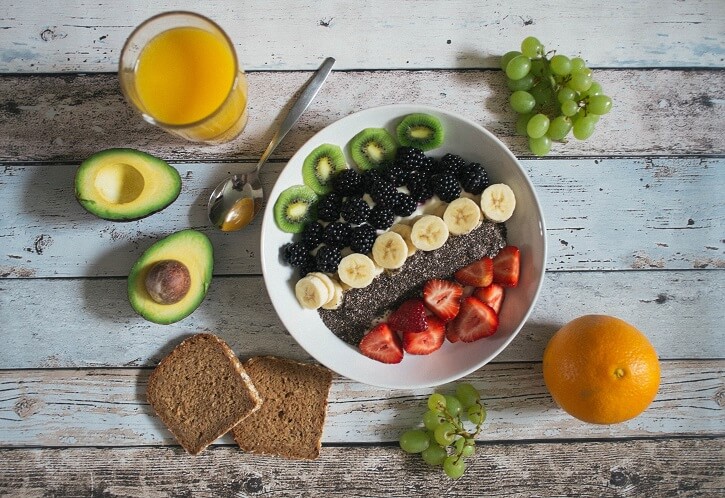If there’s one topic that is super hot right now it’s collagen. Shelves in the supplement section of natural food stores are overflowing with new collagen supplements, promising to alleviate joint pain and combat aging skin. Some collagen brands also claim to help with leaky gut, support the immune system, and balance hormones. But are these claims true? And, before jumping to supplementation, can anything be done through food to prevent collagen break down and support collagen synthesis? The short answer is, yes!
First, let’s start with some collagen groundwork.
What is collagen?
Collagen is the main protein in your body, protecting your organs, joints, and tendons, and supporting skin elasticity. It holds your bones and muscles together and maintains the lining of your gut. It’s like the “glue” that holds everything together.
Twenty-nine different types of collagen have been identified. The various collagen types and the structures they form all serve the same purpose, to help tissues withstand stretching. Your body can naturally make collagen, however, collagen synthesis decreases as you age (hello achy joints, digestive issues and less supple skin).
Now what?
How to Build Collagen Naturally
If you want to assist your body in building collagen, the best way to do that is to eat a diet rich in a variety of plant-based foods (with a special nod to leafy greens). Your body produces collagen through adequate dietary consumption of protein combined with other nutrients including vitamin C, copper, zinc, iron, vitamin E and vitamin A, to name a few.
Below is a list of nutrients that support collagen production and where you can find them.
-
Vitamin C: Vitamin C does two things (well, it does many things, but two big things to support collagen): *protects the skin, preventing collagen from breaking down *plays a role in creating new collagen By incorporating foods high in vitamin C, you can protect the collagen you already have while boosting your body’s natural production. Good plant-based sources of vitamin C include bell peppers, broccoli, Brussel sprouts, kale, citrus, strawberries, pineapple, papaya, kiwi, berries, parsley, cilantro, and thyme.
-
Copper: Copper also plays a large role in collagen production. It activates an enzyme called lysyl oxidase that’s required for collagen synthesis. Good plant-based sources of copper include nuts, seeds, tofu, tempeh, mushrooms, leafy greens and dark chocolate.
-
Iron: Iron is essential in oxygen transport and participates in many enzymatic systems in the body, with important roles in collagen synthesis. Of note, iron in meat and iron in plants are very different. The iron in meat has been associated with heart disease and certain types of cancer. The iron in plants, while less absorbable, is healthier for your body. Good plant-based sources of iron include lentils, chickpeas, beans, tofu, cashew nuts, chia seeds, ground linseed, hemp seeds, pumpkin seeds, kale, dried apricots, figs, raisins, and quinoa. Tip: Enjoy high-iron plant foods with food high in vitamin C to boost iron absorption by five times.
-
Zinc: Zinc is a cofactor (plays an essential supporting role) in the synthesis of collagen. This essential trace mineral is needed for cellular repair and helps protect collagen in the body from damage. Zinc deficiency has been shown to disrupt collagen synthesis. Good plant-based sources of zinc include lentils, beans, peas, nuts, pumpkin seeds, flax meal, chia seeds, hemp seeds, tofu, tempeh, wild rice, quinoa, mushrooms, avocado, and asparagus.
-
Vitamin A: In plant-based foods, vitamin A is in the form of carotenoids, a group of phytonutrients or specific plant nutrients. There are over 600 carotenoids, some of which are converted to vitamin A in the body. Carotene is one example of a carotenoid that is converted to vitamin A. Carotene can protect the skin from ultraviolet radiation from the inside out as well as stimulate collagen synthesis. Carotene, similar to vitamin C, acts like an antioxidant, scavenging free radicals and preventing them from doing damage. Like vitamin C, it also stimulates collagen synthesis. Good plant-based sources of carotenoids include sweet potato, carrots, corn, dark leafy greens, avocado, pumpkin, tomatoes, mango, cantaloupe, apricots, and watermelon.
-
Vitamin E: Vitamin E intake protects against collagen cross-linking, a process that plays a role in skin aging. It also helps manage the skin barrier, protecting the body from irritants and allergens, as well as maintaining skin hydration. Good plant-based sources of vitamin E include sunflower seeds, pumpkin seeds, peanut butter, hazelnuts, almonds, tomatoes, spinach, kale, collard greens, avocado, red sweet pepper, mango, turnip greens, and kiwi.
-
Amino acids: As mentioned above, three specific amino acids are needed for sustaining and creating collagen: glycine, proline, and lysine. Plant-based foods that are good sources of these amino acids include tempeh, tofu, edamame, beans, lentils, peas, pumpkin seeds, sunflower seeds, sesame seeds, hemp seeds, chia seeds, nuts, watercress, spirulina, spinach, turnip greens, mushrooms, and asparagus.
-
Catechins: Catechins are a type of phytonutrient from the polyphenol family that’s been show to protect the skin from ultraviolet light. Catechins also function to prevent improper cross-linking of collagen to elastin—the other primary protein on our skin—as we age. Good sources of catechins, which are only found in plants, include green tea, dark chocolate, broad beans, black grapes, apricots, and berries.
-
Chlorophyll: Chlorophyll is the pigment responsible for creating the beautiful green color in leafy greens and algae. Early research indicates that chlorophyll may help stimulate collagen production. One study reported that chlorophyll improves facial wrinkles and elasticity in female volunteers over the age of 45 who received two different doses of chlorophyll extract supplement for 90 days compared to baseline. Researches speculate that chlorophyll’s antioxidant properties play a role in preventing wrinkles and skin damage. Chlorophyll-rich veggies include dark leafy greens like kale, collards, spinach, and turnip greens, broccoli, Brussel sprouts, asparagus, spirulina, sprouts, and microgreens.
Plant-based foods have consistently shown to be the best weapon against cellular damage and inflammation. Filling your plate high with a variety of colorful plants will provide the necessary vitamins (vitamins C, E, and A) and minerals (copper, zinc and iron) to support the collagen currently in your body and help to build new collagen.
This article has been excerpted from Purely Planted. Visit website for more details (part one) plus additional posts on collagen (part two and part three).
Nichole Dandrea-Russert, MS, RDN, has been a registered dietitian nutritionist for 25 years, specializing in heart disease, diabetes, sports nutrition and women’s health. For the past ten years, she has focused on plant-based lifestyles through inspiring and educating people about plant-based eating to optimize their health and the health of the planet. Nichole has been featured in Eating Well, Business Insider and Atlanta Journal Constitution. She is also a media spokesperson for The Weather Channel and local Atlanta television networks. A former triathlete and current yoga instructor, she shares her passion through her website Purely Planted. Nichole is the author of The Fiber Effect. She lives in Atlanta, GA with her husband.







